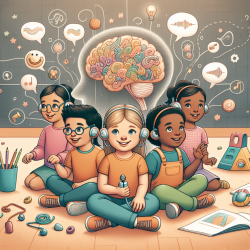In the field of speech-language pathology, making data-driven decisions is crucial to ensure the best outcomes for children. A recent study titled Symptoms of Psychopathology in Hearing-Impaired Children offers valuable insights into the mental health challenges faced by children with hearing impairments and highlights important considerations for practitioners.
According to the research, children with cochlear implants (CIs) exhibit lower levels of psychopathological symptoms compared to their peers using conventional hearing aids. The study, which included 261 children with a mean age of 11.8 years, revealed that children with hearing aids had significantly higher levels of internalizing and externalizing symptoms than both children with CIs and normally hearing children.
Here are some key findings from the study:
- Children with CIs had psychopathological symptoms comparable to those of normally hearing children.
- Children with hearing aids exhibited higher levels of internalizing (e.g., depression, anxiety) and externalizing (e.g., hyperactivity, aggression) symptoms.
- Factors such as better communication skills, language skills, lower age at detection and intervention, and higher socioeconomic status (SES) were associated with fewer psychopathological symptoms.
These findings underscore the importance of early and intensive rehabilitation programs. Children with CIs often receive extensive and personalized rehabilitation, including speech therapy and family counseling, which may contribute to their better mental health outcomes. In contrast, children with hearing aids typically receive less intensive support, which might explain their higher levels of psychopathological symptoms.
For practitioners, this research highlights several actionable steps:
- Early Intervention: Prioritize early detection and intervention for hearing impairments to reduce the risk of developing psychopathological symptoms.
- Comprehensive Rehabilitation: Implement comprehensive and intensive rehabilitation programs for children with hearing aids, similar to those provided to CI recipients.
- Focus on Communication Skills: Encourage the development of strong communication and language skills to mitigate mental health challenges.
- Multidisciplinary Approach: Collaborate with mental health professionals, speech therapists, and family counselors to provide holistic care.
In conclusion, the study by Theunissen et al. (2015) provides compelling evidence that the type and intensity of rehabilitation programs significantly impact the mental health outcomes of hearing-impaired children. Practitioners should leverage these insights to enhance their therapeutic strategies and support the well-being of their young clients.
To read the original research paper, please follow this link: Symptoms of Psychopathology in Hearing-Impaired Children.










